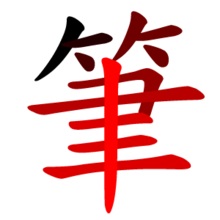 Kanji
Grade 1 - 上 Kanji
Grade 1 - 上
Kanji character Grade 1 上. Writing practice along
with onyomi and kunyomi readings.
Click the writing practice application link on either sidebar if you
want to try writing this kanji character online. |
|
|
|
|
|
|
|
|
|
About |
above, up
Kun: うえ、 -うえ、 うわ-、 かみ、 あ.げる、 -あ.げる、 あ.がる、 -あ.がる、 あ.がり、 -あ.がり、 のぼ.る、
のぼ.り、 のぼ.せる、 のぼ.す、 たてまつ.る
On: ジョウ、 ショウ、 シャン
3 strokes
Radical: one 一
Parts: 一 卜 |
|
|
|
Onyomi |
上 【ジョウ】 from the standpoint of, as a matter of (e.g. fact), in the
field of, being of the type of, aboard (a ship or vehicle), on top
of, on, above, first volume (e.g. book), superior quality, best,
top, high class, going up, governmental, imperial, presenting,
showing, ana-
上位 【ジョウイ】 superior (in rank), top, ranking, higher order (e.g.
byte), host computer (of connected device)
口上 【コウジョウ】 vocal message, speech, statement, prologue at the start
of a kabuki performance
水上 【スイジョウ】 aquatic, on the water
上人 【ショウニン】 holy priest, saint
上下 【ショウカ】 top and bottom, up and down, high and low, above and
below, upper and lower ends, upper and lower classes, ruler and
ruled, the government and the people
主上 【シュジョウ】 emperor
雲上 【ウンジョウ】 above the clouds, the heavens
上海 【シャンハイ】 Shanghai (China)
上湯 【シャンタン】 top-grade Chinese soup stock |
|
|
|
Kunyomi |
上 【うえ】 above, up, over, elder (e.g. daughter), top, summit, head
(e.g. of a staircase), surface, before, previous, superiority, one's
superior, one's elder, on top of that, besides, what's more, not
only ... but, upon (further inspection, etc.), based on (and
occurring after), matters concerning ..., as concerns ..., since
(i.e. "for that reason"), honorable, venerable, place of one's
superior (e.g. the throne), emperor, sovereign, shogun, daimyo,
noblewoman (esp. the wife of a nobleman)
上向き 【うわむき】 pointing up, pointing upward, upturn, uptrend, upward
tendency
床上 【ゆかうえ】 on a floor, above floor level
一枚上 【いちまいうえ】 one step higher, one better, cut above, one up
上 【かみ】 upper reaches (of a river), upper stream, top, upper part,
upper half (of the body), long ago, beginning, first, person of high
rank (e.g. the emperor), government, imperial court, imperial
capital (i.e. Kyoto), capital region (i.e. Kansai), region (or
direction of) the imperial palace, head (of a table), wife, mistress
(of a restaurant)
上方 【かみがた】 Kyoto and vicinity (esp. during Edo period), Kyoto-Osaka
region, Kansai region
風上 【かざかみ】 windward, upwind
御上 【おかみ】 the Emperor, His Majesty, the government, the authorities,
proprietress, hostess, landlady, mistress, your wife, his wife,
(one's) master, lord
上げる 【あげる】 to raise, to elevate, to do up (one's hair), to fly (a
kite, etc.), to launch (fireworks, etc.), to surface (a submarine,
etc.), to land (a boat), to deep-fry, to show someone (into a room),
to give, to send someone (away), to enrol (one's child in school),
to enroll, to increase (price, quality, status, etc.), to develop
(talent, skill), to improve, to make (a loud sound), to raise (one's
voice), to earn (something desirable), to praise, to give (an
example, etc.), to cite, to summon up (all of one's energy, etc.),
to arrest, to nominate, to summon (for geishas, etc.), to offer up
(incense, a prayer, etc.) to the gods (or Buddha, etc.), to bear (a
child), to conduct (a ceremony, esp. a wedding), (of the tide) to
come in, to vomit, to do for (the sake of someone else), to complete
..., to humbly do ...
上がる 【あがる】 to rise, to go up, to come up, to ascend, to be raised, to
enter (esp. from outdoors), to come in, to go in, to enter (a
school), to advance to the next grade, to get out (of water), to
come ashore, to increase, to improve, to make progress, to be
promoted, to advance, to be made (of profit, etc.), to occur (esp.
of a favourable result), to be adequate (to cover expenses, etc.),
to be finished, to be done, to be over, (of rain) to stop, to lift,
to stop (working properly), to cut out, to give out, to die, to win
(in a card game, etc.), to be arrested, to turn up (of evidence,
etc.), to be deep fried, to be spoken loudly, to get nervous, to get
stage fright, to be offered (to the gods, etc.), to go, to visit, to
eat, to drink, to be listed (as a candidate), to serve (in one's
master's home), to go north, to be complete, to finish
上がり 【あがり】 rise, increase, ascent, income, takings, earnings,
proceeds, (crop) yield, return, profit, completion, end, finish, end
result (e.g. of crafts), how something comes out, finish, finishing
(in a board or card game, etc.), green tea (esp. in a sushi
restaurant), after (rain, illness, etc.), ex- (e.g. ex-bureaucrat),
former
上がり下り 【あがりおり】 going up and down, ascent and descent
芸者上がり 【げいしゃあがり】 ex-geisha, former geisha
上る 【のぼる】 to ascend, to go up, to climb, to ascend (as a natural
process, e.g. the Sun), to rise, to go to (the capital), to be
promoted, to add up to, to advance (in price), to swim up (a river),
to sail up, to come up (on the agenda)
上り 【のぼり】 ascent, climbing, ascending (path), climb, up-train, train
heading toward the starting point of its route, upbound (esp. toward
Tokyo)
上り下り 【のぼりくだり】 rising and falling, going up and down
逆上せる 【のぼせる】 to feel dizzy, to have blood rush to one's head, to lose
one's cool, to be obsessed, to be infatuated, to become conceited
上せる 【のぼせる】 to raise, to record, to bring up (a matter), to serve
(food), to send some on out
上す 【のぼす】 to raise, to record, to bring up (a matter), to serve
(food), to send someone out |
|
 Japanese
Hiragana Katakana Kanji
Japanese
Hiragana Katakana Kanji


